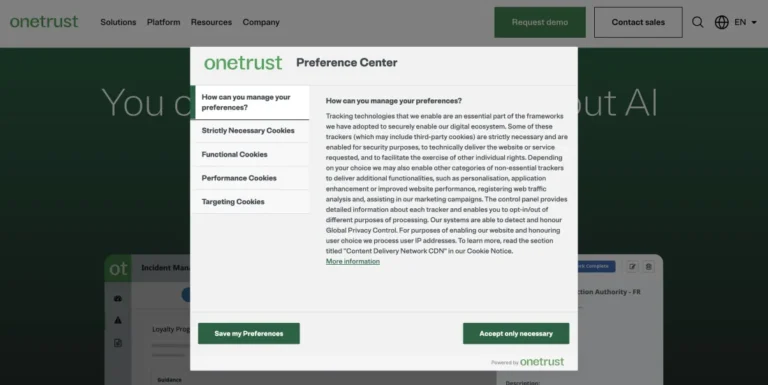Businesses operating globally face a complex web of privacy regulations governing cookie usage and data collection practices. Understanding and complying with these diverse regulations isn’t just good practice – it’s essential for avoiding hefty fines and building customer trust. This comprehensive guide explores privacy regulations across continents and provides practical compliance strategies for global businesses.
Why Cookie Compliance Matters
Before diving into specific regulations, it’s important to understand why cookie compliance should be a priority:
- Financial consequences: Non-compliance can result in significant fines—up to 4% of global revenue under GDPR
- Consumer trust: 86% of consumers care about data privacy, with many abandoning websites with poor privacy practices
- Competitive advantage: Strong privacy practices differentiate your brand in an increasingly privacy-conscious market
- Legal requirements: Mandatory compliance for businesses operating in regulated territories
Europe: The Global Privacy Leader
GDPR (European Union)
The General Data Protection Regulation represents the gold standard for privacy legislation worldwide. Implemented in 2018, GDPR affects any business with EU customers, regardless of where the business is located.
Businesses must implement explicit, informed consent mechanisms before setting non-essential cookies, provide comprehensive privacy notices, and ensure easy consent withdrawal options. The regulation mandates data breach notification within 72 hours and requires Data Protection Impact Assessments for high-risk processing activities, directly impacting operational procedures for digital businesses.
UK DPA (United Kingdom)
Post-Brexit, the UK established its own version of GDPR through the Data Protection Act 2018, which maintains similar stringent requirements with UK-specific adaptations. Companies operating in both the EU and UK must note differences including UK-specific national security exemptions and a different approach to children’s data (setting age 13 as the threshold for consent rather than 16 in many EU countries).
FADP (Switzerland)
The newly revised Federal Act on Data Protection represents Switzerland’s approach to aligning with GDPR standards while maintaining sovereignty.
Businesses serving Swiss customers need to implement strengthened individual rights protections and enhanced transparency mechanisms. The law requires mandatory data breach notifications for high-risk situations.
DPA (Norway)
As part of the European Economic Area, Norway implements GDPR through its national Data Protection Act, with additional Norway-specific provisions that businesses operating in the Norwegian market must consider.
North America
PIPEDA (Canada)
The Personal Information Protection and Electronic Documents Act governs how private-sector organizations collect, use, and disclose personal information.
Businesses must obtain knowledge and consent for data collection, limit collection to reasonable purposes, and provide individuals access to their personal information upon request.
CCPA/CPRA (California)
The California Consumer Privacy Act, enhanced by the California Privacy Rights Act, provides the strongest consumer privacy protections in the United States.
Companies doing business in California must implement mechanisms allowing consumers to know what personal information is collected, delete personal information upon request, and opt-out of personal information sales.
The regulations prohibit discrimination against consumers exercising their privacy rights, creating new operational challenges for digital business models.
CPA (Colorado)
The Colorado Privacy Act introduces comprehensive privacy protections for Colorado residents. Businesses serving Colorado customers must implement consumer rights systems allowing users to access, delete, and correct personal data.
The law requires explicit consent for sensitive data processing and mandates data protection assessments for high-risk activities.
VCDPA (Virginia)
The Virginia Consumer Data Protection Act establishes a framework similar to the GDPR but with some business-friendly distinctions. Organizations must implement consent mechanisms for sensitive data processing and provide opt-out capabilities for data sales, targeted advertising, and profiling.
Asia
PIPA (South Korea)
The Personal Information Protection Act is one of Asia’s strongest privacy frameworks, recently updated to achieve adequacy status with the EU. Businesses operating in the South Korean market must implement purpose-specific collection processes, obtain prior informed consent, and minimize data retention. The law creates significant operational considerations for international companies with South Korean customers.
PIPL (China)
The Personal Information Protection Law represents China’s first comprehensive privacy legislation with extraterritorial application.
Organizations handling Chinese consumer data must establish legal basis for personal information processing and implement enhanced mechanisms for cross-border data transfers. With significant penalties of up to 5% of annual revenue, compliance becomes a material business risk for companies operating in China.
Data Privacy Act 2012 (Philippines)
It imposes requirements on entities processing personal information of Philippine citizens or residents. Companies must implement consent mechanisms for data collection, establish security measures, and maintain data breach notification protocols that can significantly impact business operations.
PDPA (Singapore)
The Personal Data Protection Act balances individual rights with business needs for personal data.
Organizations serving Singaporean customers must implement consent mechanisms, purpose limitation guardrails, and data protection measures that affect marketing, customer service, and data management practices.
Middle East
PDPL (UAE)
The Personal Data Protection Law establishes a comprehensive data protection framework for the United Arab Emirates. Companies operating in the UAE must establish legal bases for processing personal data, implement cross-border transfer safeguards, and adhere to data minimization principles that impact data collection.
DIFC DPA (Dubai)
The Dubai International Financial Centre Data Protection Law aligns with GDPR principles for this significant business hub.
Organizations within the DIFC (Dubai International Financial Centre – special economic zone in Dubai) must implement explicit consent mechanisms, conduct data protection impact assessments, and establish data breach notification protocols, creating specific compliance requirements for financial and professional services firms.
PDPL (Saudi Arabia)
Saudi Arabia’s Personal Data Protection Law marks a significant development in the region’s privacy landscape.
Businesses operating in Saudi Arabia must implement consent frameworks for data collection and processing, establish cross-border transfer mechanisms, and ensure data minimization practices.
KVKK (Turkey)
Turkey’s Personal Data Protection Law bridges European and Middle Eastern approaches to data protection. Companies serving Turkish customers must register as data controllers, implement explicit consent mechanisms, and navigate cross-border transfer limitations.
Central and South America
LGPD (Brazil)
The Lei Geral de Proteção de Dados Pessoais closely resembles GDPR, establishing comprehensive data protection in South America’s largest economy.
Organizations serving Brazilian customers must establish legal bases for data processing, implement data subject rights frameworks, and conduct Data Protection Impact Assessments that affect operational processes.
DPL (Colombia)
Colombia’s Data Protection Law (Ley 1581 de 2012) establishes data protection principles. Companies must implement prior informed consent mechanisms, adhere to purpose specification requirements, and establish systems for handling access and deletion requests.
Personal Data Protection Law (Argentina)
Argentina was among the first Latin American countries to establish comprehensive data protection, recently working on updates to maintain EU adequacy status.
Businesses operating in Argentina must implement consent frameworks, register databases containing personal data, and navigate cross-border transfer restrictions that affect global data strategy.
LSPDP (Panama)
Panama’s Law on Protection of Personal Data establishes modern privacy protections requiring businesses to implement consent mechanisms, data security measures, and cross-border transfer protocols that influence technology infrastructure and data governance approaches.
Africa
POPIA (South Africa)
The Protection of Personal Information Act represents Africa’s most comprehensive data protection law.
Businesses operating in South Africa must implement processing limitations, adhere to purpose specification requirements, and establish protections for children’s data.
Law No.09-08 (Morocco)
Morocco’s data protection law establishes protection for personal data processing. Companies serving Moroccan customers must implement processing notification systems, establish data rights frameworks, and navigate cross-border transfer restrictions.
LPDP (Egypt)
The Data Protection Law establishes Egypt’s first comprehensive data protection framework.
Organizations operating in Egypt must obtain licenses for data processing activities, implement data subject rights mechanisms, and establish cross-border transfer protocols that affect regional business strategies.
DPA (Kenya)
Kenya’s Data Protection Act creates a modern framework for personal data protection. Businesses must adhere to data processing principles including lawfulness and transparency, register as data controllers when required, and implement systems for handling access and correction requests.
Oceania
APP (Australia)
The Australian Privacy Principles under the Privacy Act establish the framework for privacy protection in Australia.
Organizations operating in Australia must implement open and transparent information management practices, provide pre-collection notices, and adhere to restrictions on use and disclosure that influence marketing and data sharing initiatives.
Privacy Act (New Zealand)
New Zealand’s Privacy Act 2020 modernized the country’s prior privacy framework with stronger protections.
Businesses serving New Zealand customers must adhere to information privacy principles, implement breach notification protocols, and navigate cross-border transfer restrictions.
Global Privacy Regulations – List
For quick reference, here’s a comprehensive list of major privacy regulations worldwide:
Europe
- GDPR (European Union)
- UK DPA (United Kingdom)
- FADP (Switzerland)
- DPA (Norway)
- LDPD (Lithuania)
- PDPA (Finland)
- FDPA (France)
- BDSG (Germany)
- Garante Privacy (Italy)
- LOPDGDD (Spain)
North America
- PIPEDA (Canada)
- CCPA/CPRA (California)
- CPA (Colorado)
- VCDPA (Virginia)
- CTDPA (Connecticut)
- UCPA (Utah)
- SHIELD Act (New York)
- LGPD (Quebec)
Asia
- PIPA (South Korea)
- PIPL (China)
- Data Privacy Act 2012 (Philippines)
- PDPA (Singapore)
- APPI (Japan)
- PDPA (Thailand)
- PDP Bill (India)
- PDPL (Indonesia)
Middle East
- PDPL (UAE)
- DIFC DPA (Dubai)
- PDPL (Saudi Arabia)
- KVKK (Turkey)
- PDPL (Bahrain)
- DPL (Qatar)
Central and South America
- LGPD (Brazil)
- DPL (Colombia)
- Personal Data Protection Law (Argentina)
- LSPDP (Panama)
- Federal Law on Protection of Personal Data (Mexico)
- Data Protection Law (Chile)
- Personal Data Protection Law (Uruguay)
Africa
- POPIA (South Africa)
- Law No.09-08 (Morocco)
- LPDP (Egypt)
- DPA (Kenya)
- NDPR (Nigeria)
- DPA (Mauritius)
- Cyber Security and Data Protection Bill (Zimbabwe)
Oceania
- APP (Australia)
- Privacy Act (New Zealand)
- Privacy Act (Fiji)
Implementing Global Cookie Compliance
For businesses operating across multiple jurisdictions, implementing a comprehensive cookie compliance strategy involves:
1. Cookie Audit and Classification
- Document all cookies your websites and applications use
- Classify each cookie (necessary, preference, statistics, marketing)
- Determine retention periods and third-party data sharing
2. Geographic Segmentation
- Implement geolocation detection
- Apply appropriate consent mechanisms based on user location
- Customize privacy notices to match regional requirements
3. Consent Management Implementation
- Deploy a consent management platform (CMP) supporting multiple regulations
- Ensure granular consent options (accept all, reject all, preferences)
- Maintain comprehensive consent records
- Enable easy consent withdrawal
4. Privacy Notice Enhancement
- Create layered privacy notices (summary + detailed)
- Ensure clarity and accessibility
- Include all required disclosures for relevant regulations
- Update regularly as regulations evolve
5. Data Subject Rights Management
- Establish processes for handling access, deletion, and correction requests
- Create region-specific response templates
- Implement verification procedures
- Track and document all requests
Future-Proofing Your Compliance Strategy
Privacy regulations continue to evolve globally. Future-proof your approach by:
- Monitoring regulatory developments: Stay informed about amendments and new legislation
- Adopting privacy by design: Build privacy considerations into all new products and features
- Regular compliance audits: Conduct periodic assessments of your privacy program
- Employee training: Ensure team members understand privacy requirements
- Documentation: Maintain comprehensive records of compliance efforts
Conclusion
Navigating global cookie consent and privacy compliance requirements presents significant challenges for international businesses.
The investment in privacy practices isn’t just about avoiding penalties – it’s about demonstrating respect for customer data in a world increasingly concerned with digital privacy. Organizations that recognize this fundamental shift in consumer expectations will be best positioned for long-term success in the global marketplace.
This article provides general information for educational purposes only and should not be construed as legal advice. Businesses should consult with qualified legal counsel for specific compliance guidance.



